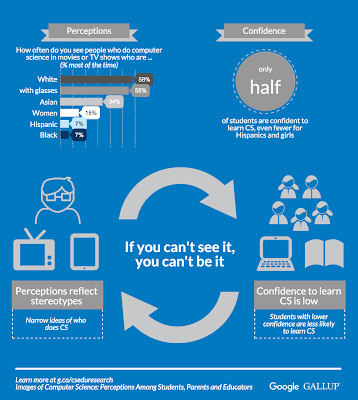Editor's note: For CSEdWeek this December 7-13, we are encouraging students to try High Seas and Inside Out, Google’s new introductory Hour of Code activities. We’re also going behind the scenes on the Google for EDU blog with stories and resources for the parents, educators and students that champion CS education every day. Stay tuned this week to learn more!
This year, Computer Science Education Week runs from December 7 through 13th and students, teachers, volunteers and organizations across the world will participate in a wide variety of activities and events. Very few people know, however, that it all began with one person who wanted to make things better.
In 2008, Calvin College Computer Science professor Joel Adams attended a regional ACM conference where he attended a session focused on advocating for computer science education. This session inspired him to question why secondary school students in his home state of Michigan had so few opportunities to take rigorous computer science courses when the data showed a tremendous demand for jobs in computing-related fields. Adams was especially concerned because the downturn in manufacturing had devastated Michigan and he believed his students deserved better opportunities and better jobs. Adams collected the jobs and education-related data and made an appointment with Dr. Vern Ehlers, his representative in the United States Congress. Ehlers heard Adams’ message and decided to take action.
Meanwhile, ACM and the Computer Science Teachers Association had been working to raise the profile of K–12 computer science education nationally. Cameron Wilson (then ACM’s Director of Public Policy) happened to be a former staffer for Rep. Ehlers. Following the meeting with Adams, with Ehler’s support, Wilson and Ehlers’ staffer Julia Jester drafted a resolution to designate the week of Grace Murray Hopper’s birthday as “National Computer Science Education Week”.
House Resolution 558 was introduced June 18, 2009. Rep Bart Gordon (D-TN) introduced the resolution in the House and Rep. Ehlers (R-MI) spoke eloquently in favor of his motion as did Jared Polis (D-CO). The resolution passed and was enacted on October 20, 2009 and with the help of numerous organizations, companies (Google among them) and individuals, the first celebration took place the week of December 7, 2009.
The annual event continued to grow and in 2013 it reached unprecedented levels with the participation of Code.org and the launch of the Hour of Code. Thanks to Code.org’s efforts, public figures from Ashton Kutcher to President Obama were talking about the importance of learning computer science. To date, more than 137,683,279 people have gotten a taste of computer science as Hour of Code participants.
As the global conversation about the importance of computer science education has grown, so too have the events. In Europe, Google helped launch EU Code Week which took place October 10-18th, 2015 with more than 150,000 people and 4000 events in 37 countries. From October 1-10, 2015, again with help from Google, 88,763 children and youth participated in more than 3,000 events in 17 countries during Africa Code Week. These are just two examples of the computer science education celebrations internationally.
Computer Science Education Week, whatever the event is called and whenever it takes place, is now a global experience. Everyone is invited to participate, and anyone can make a difference. And you can be sure that you will be hearing more about what Google is planning. But it is worth knowing and remembering that it all began with one man, who wanted to make life better for his students and did something about it.
Stay tuned for more posts on this topic throughout the week tagged with #CSEdWeek2015, on our Twitter and Google+ pages, too!






